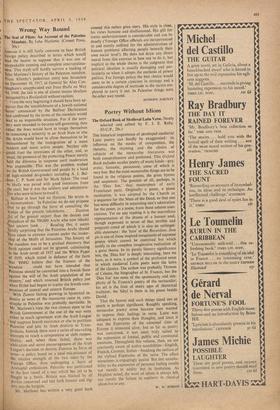Wrong Way Round
The Seat of Pilate: An Account of the Palestine Mandate. By John Marlowe. (Cresset Press, 0 30s.)
t'
ABROAD it is still fairly common to hear British foreign policy described in terms which would lead the hearer to suppose that it was one of 'unspeakable cunning and complete unscrupulous- ness. This myth will hardly survive a reading of John Marlowe's history of the Palestine mandate. From Allenby's pedestrian entry into Jerusalem on December 10, 1917, to General Sir Alan Cun- ningham's unapplauded exit from Haifa on May 14, 1948, the tale is one of almost insane idealism mitigated by a Realpolitik without realism.
From the very beginning it should have been ap- parent that the 'establishment of a Jewish national home' announced by the Balfour Declaration 'and confirmed by the terms of the mandate would lead to an impossible situation. For if the terri- tory were intended to become self-governing, then either the Jews would have to resign themselves to remaining a minority in an Arab State or else the Arabs would have to allow themselves to be outnumbered by the immigration of a more modern and more active people. Neither side could trust the intentions of the other, and, as usual, the presence of the protecting Power merely held the dilemma in suspense until moderation was impossible. This was the problem wished on the British Government and people by a band of high-minded do-gooders including A. J. Bal- four, C. P. Scott and Sir Mark Sykes. The road to Haifa was paved with good intentions from (he start, but it was the soldiers and administra- tors who were to have to tread it.
Balfour at least had no illusions. He wrote in a memorandum : 'In Palestine we do not propose , ever to go through the form of consulting the Wishes of the present inhabitants. . . . Zionism tisl of far greater import than the desires and prejudices of the 700,000 Arabs who now inhabit 'that ancient land. . . .' Reading this, it seems hardly surprising that the Palestine Arabs should have taken to extreme courses under the leader- ship of the Mufti of Jerusalem. The history of the mandate was to be a gradual discovery that Arab opinion could not be ignored, culminating in the Arab revolt of 1937 and the White Paper of 1939, which stated in defiance of the facts that 'HMG believe that the framers of the mandate . . could not have intended that 'Palestine should be converted into a Jewish State against the will of the Arab population of the Country,' and which reversed British policy just when Hitlet had begun to scatter the Jewish com- munities of central and eastern Europe.
With Zionist feeling growing to hysterical in- tensity as news of the massacres came in, cata- strophe in Palestine was probably inevitable. In Mr. Marlowe's view the two choices open to the British Government at the end of the war were either to reach agreement with the Arab League and suppress Jewish resistance or else to partition Palestine and join its Arab districts to Trans- jordania. Instead, there were a series of unavailing attempts to reach a compromise or shift respon- sibility; and, when these failed, there was abdication and secret encouragement of the Arab League's decision to destroy Zionism by force of arms—a policy based on a total mis-estimate of the relative strength of the two sides' by the Foreign Office, then undergoing a, burst of Arabophil enthusiasm. Palestine was partitioned in the first round of a war which has yet to be fought to a finish. Britain was blamed by all parties concerned and lost both honour and dig- nity into the bargain.
Mr. Marlowe has written a very good book
around this rather grim story. His style is clear, his views humane and disillusioned. His gift for ironic understatement is considerable and can be deadly ('Foreign Office officials are inexperienced in and mostly unfitted for the administration of human problems affecting people beneath their own social level'). He does not draw any direct moral from this exercise in how not to do it, but implicit in the whole theme is the judgment that political idealism is usually damaging and par- ticularly so when it adopts the methods of power politics. For foreign policy the best choice would seem to be a certain cynicism in strategy and a considerable degree of rectitude in the tactics em- ployed to carry it out. In Palestine things were the other way round.
ANTHONY HARTLEY


































 Previous page
Previous page